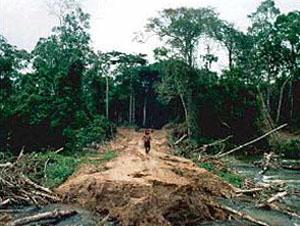Tropical forests and global warming
Logging in the Brazilian rainforest. (Image: whyfiles.org)
Experts in deforestation, rural development, and climate are all working together to make sure that the next international treaty on climate includes measures to slow the destruction and degradation of forests. "Living on Earth’s" Ingrid Lobet takes a look now at the driving forces of tropical deforestation.
Even some veteran environmentalists have been startled to realize how much the cutting and burning of tropical forests is responsible for global warming.
Nobel Laureate and tree-planting movement founder Wangari Maathai, spoke at recent climate change talks in Poznan, Poland: "Because quite often, we in the developing world, we say we are not contributing much to greenhouse gases. But obviously if you take into account deforestation, land degradation, the fact that the majority of people use wood for lighting or cooking, then obviously they are releasing a lot of greenhouse gases into the atmosphere, far more than I’m sure people are aware of."
In Africa, Maathai says, it’s often villagers who cut the forest to plant crops: "And because communities do not have an understanding of how to use the land sustainably, prevent soil erosion, when you fly over Africa, you see a lot of that slash and burn, especially within the Congo Basin forest."
That’s in Africa. But the reasons for deforestation differ sharply across the tropics. Lars Lovold, director of Rainforest Foundation Norway, has worked with indigenous people in forests for 30 years: "We have all heard from official sources, blaming deforestation on the poor. It is not true. It is the large-scale investments, in oil palms for Asia, in cattle for Central and South America, industrial agriculture taking over from cattle in South America, timber plantations on many continents that really drives deforestation on a large scale."
The Brazilian rainforest is being cut largely for two reasons: to graze cattle for beef for domestic and European markets and to grow soybeans for soy oil, soy products and biofuels.
Ken Chomitz is senior advisor at the World Bank’s Independent Evaluation Group. Like Lovold, he says evidence suggests large-scale players are a big part of the story: "Much of the world’s tropical deforestation is concentrated in a few areas in the Brazilian frontier and also in Indonesia. And what we know about Brazil suggests that a lot of the clearing in Brazil is done in large chunks: we’re talking a thousand, two thousand acres at a time, which is far too big to be accomplished by anyone but a large industrial interest with bulldozers and machinery."
Hosted by Steve Curwood, "Living on Earth" is an award-winning environmental news program that delves into the leading issues affecting the world we inhabit. More "Living on Earth.
